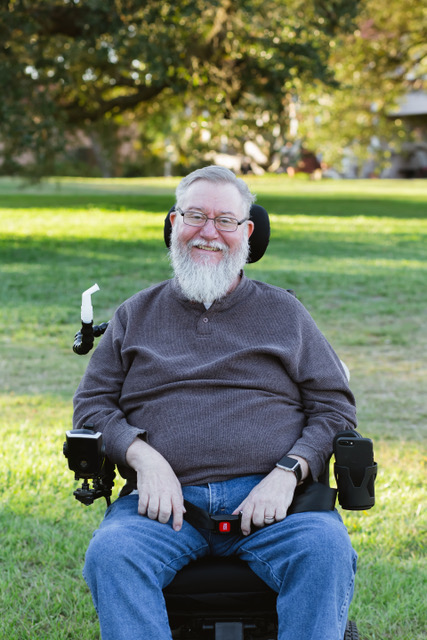Finding Peace Despite Terminal Illness

“…my ultimate prognosis has not changed. At some undetermined time in the future, if everything remains as it is now, the muscles that control my lungs will stop working … and I will die.
Drawing on my years as a pastor, I’ve discovered there are only two ways that a person may greet such news. The first is with varying degrees of fear. The second is with varying degrees of peace. I have never witnessed a third option…”
I am dying.
That statement, by itself, isn’t all that remarkable, since it’s true of all of us. Everyone reading these words is dying. What makes that statement unique is that my process of dying has been accelerated. After many visits and tests, and much poking and prodding, the doctors have told me that I have a terminal disease. In other words, I have an active illness that will inevitably end in my death. I won’t die of old age. My disease will kill me.
In August of 2017, I was told that I have ALS. After trying on a few other diagnoses first, this is the only one that fit. When I asked about a prognosis, my neurologist said, “I’m fairly certain you will live six months. You could live a year, eighteen months at the outside.” Since that time I’ve been told that the progress of my disease has been slower than expected. Now my doctors no longer guess at my life expectancy.
But my ultimate prognosis has not changed. At some undetermined time in the future, if everything remains as it is now, the muscles that control my lungs will stop working … and I will die.
Drawing on my years as a pastor, I’ve discovered there are only two ways that a person may greet such news. The first is with varying degrees of fear. The second is with varying degrees of peace. I have never witnessed a third option.
At the extreme end of the fear spectrum is panic. I recently witnessed such panic in a person I met during one of my treatments. Bob (not his real name) is a likable enough fellow, but he is a driven man. Like me, he has ALS. He refuses to call his ALS “Lou Gehrig’s disease” because it has nothing to do with Lou Gehrig. It is his disease. It is Bob’s disease.
After his diagnosis, his sole mission in life was to find a treatment that worked. He told me that he couldn’t go to the bathroom in the middle of the night without stopping by his computer and doing a search to see if some new breakthrough had been achieved. He ordered experimental medicines from India and Japan. He sent me videos on cannabis and nutrition that made extraordinary claims. Simply put, he refused to accept what the doctors told him. There must be — MUST BE! — something that worked.
When I asked him why he was afraid to die, he denied that he was. He said he was merely thinking of his wife and children and how to support them. But I knew he was lying. He never mentioned getting his finances in order or the plans he was making to provide for his family. His entire focus was on himself. On getting better. On not dying.
In contrast to Bob, there’s … well … me. I’m not panicked. I’m not afraid. In fact, I’m routinely cheerful, and that makes me stick out (or at least so I’m told). Of the doctors and nurses that have attended me, the vast majority have commented on the extreme peace I exhibit — and most want to know why I have it. A few have asked me directly. More often they query my wife. One doctor asked my sister. But the majority opinion is that I am somehow different. That I’m not normal. That I am in possession of something the average individual does not have.
And that’s why I’m writing this book. I want you to have what I have.
Really, there’s nothing unusual about me. I’m just an average guy with a terminal disease. What makes me different is not who I am, but who I know and what he has promised.
The good news is that you can know him too, and when you understand what that means—when you really understand what that means—you’ll be like me: Just an average guy with a terminal disease who has a peace that surpasses all understanding.
Bruce A. Baker
November 20, 2018

